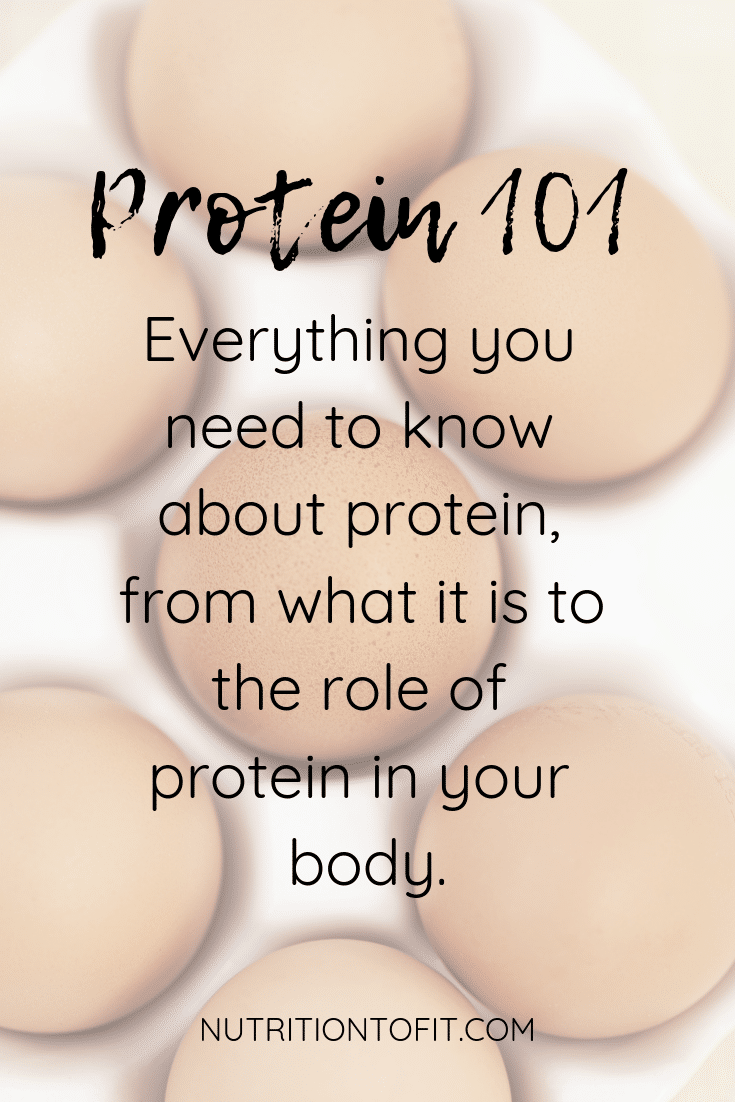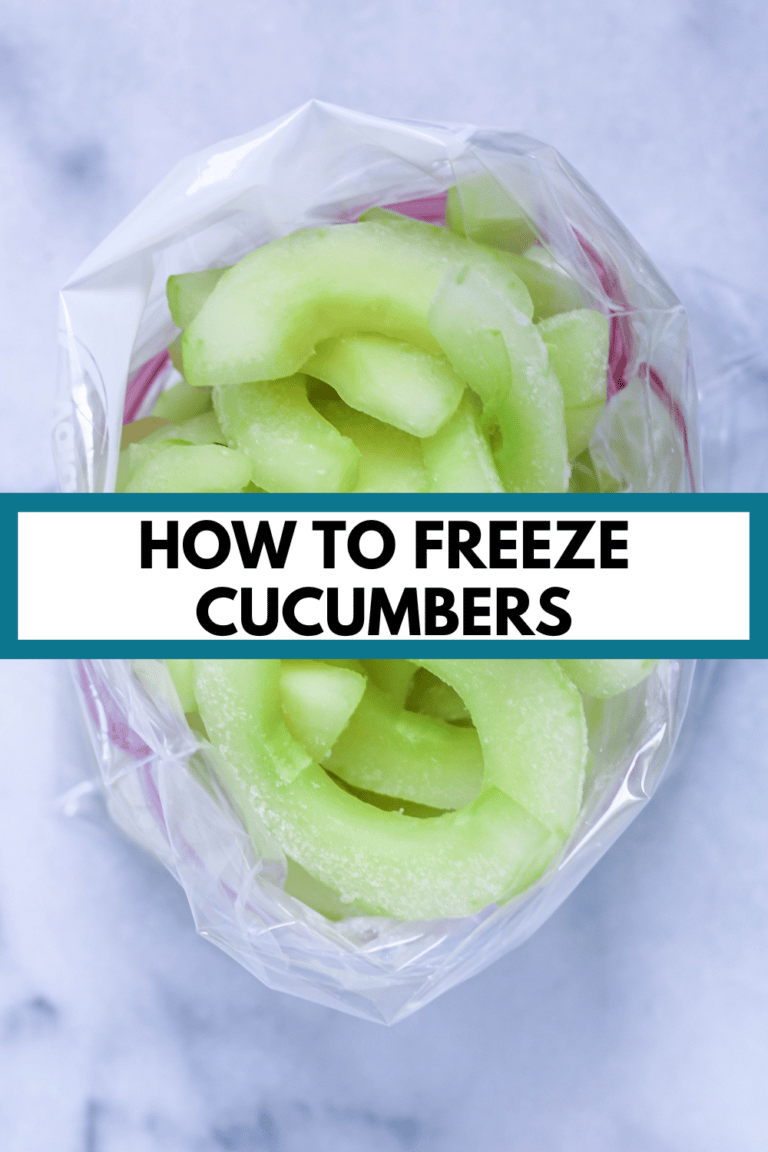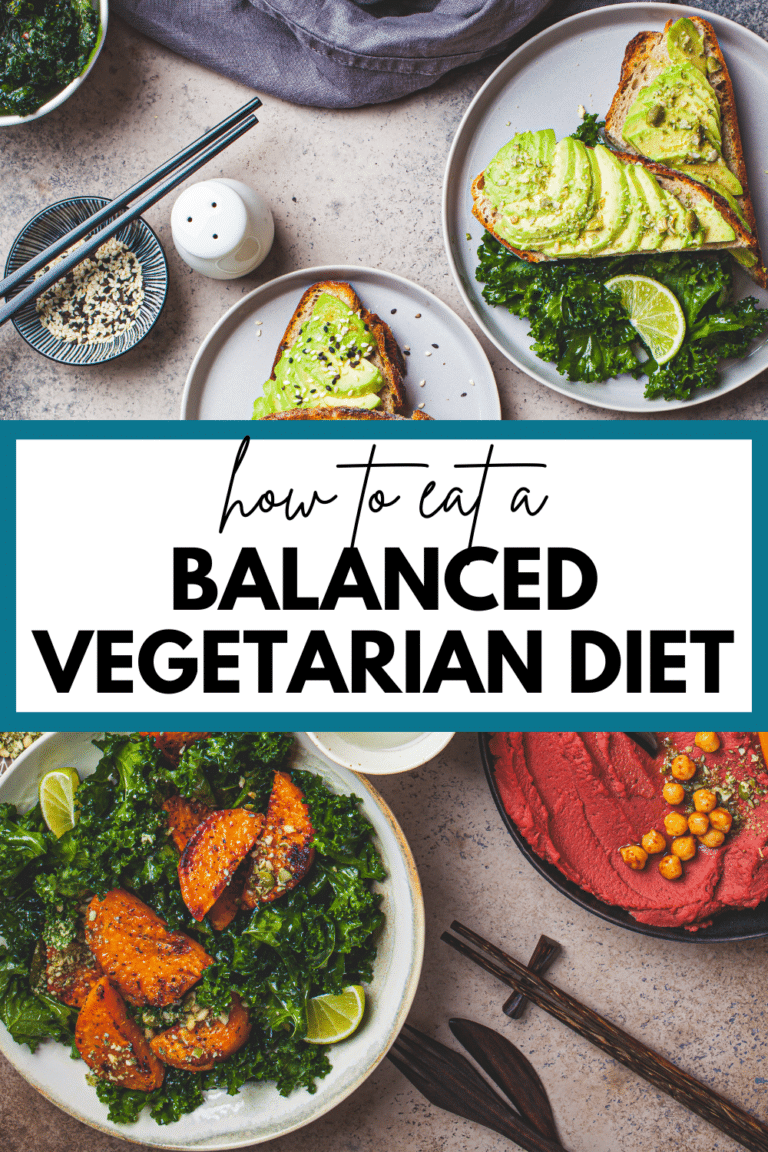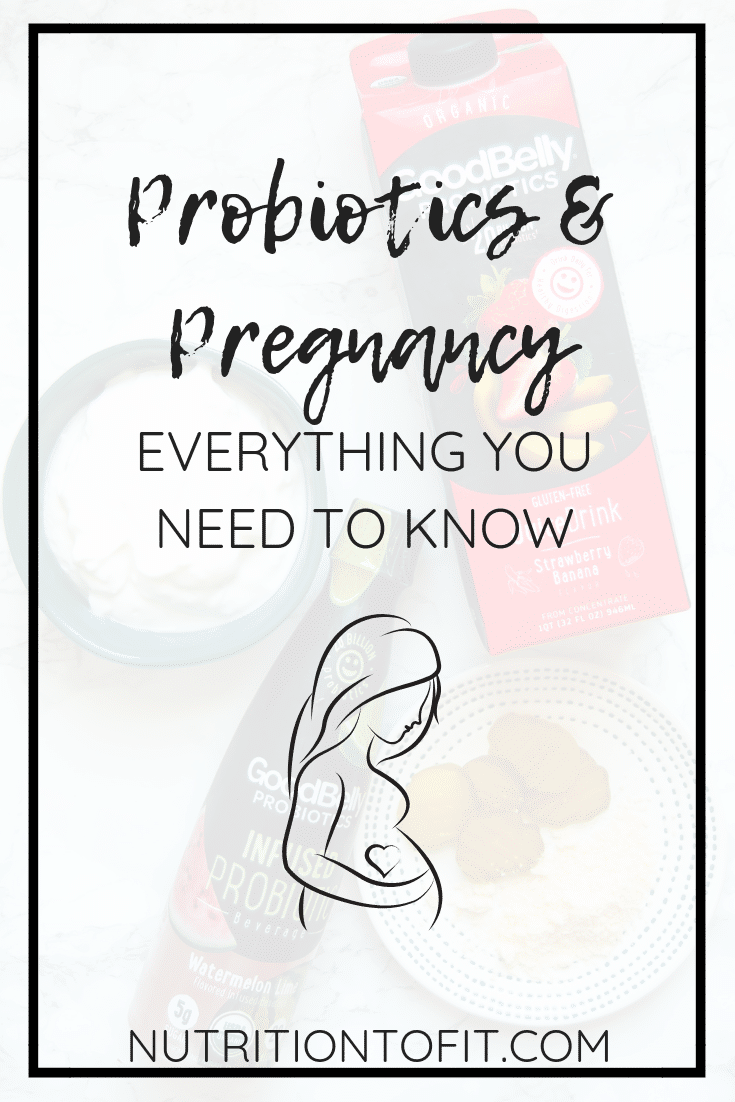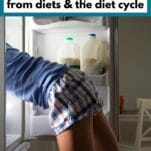The Diet Cycle: Why Failing Your Diet Isn’t Your Fault
Wondering about the diet cycle? Let’s see if this scenario sounds familiar:
You’re feeling a little frustrated at how your clothes are fitting and tired of feeling, well, just so tired. So you decide it’s time to focus on your health and finally lose some weight.
You pick a diet. The diet feels okay at first, you start out strong and feel pretty good. But sooner or later, the initial excitement wears off. The weight that seemed to fall off initially now seems stuck, or worse – is creeping up again.
Now you’re feeling pretty frustrated. You can’t stop thinking about food, you hate going to bed hungry, and you’re starting to wonder how long your motivation can really last.
And one day, all those deprived feelings come to a head and you find yourself throwing in the towel on your diet. What starts as a small cheat ends with you overeating or a full on binge. Now you feel awful.
It’s not just physically uncomfortable and unpleasant post-overeating either. You feel terrible mentally and emotionally. Shame sets in. You’re embarrassed and frustrated that you caved so easily.
To rub salt in the wound, the next morning when you step on the scale you see that it’s jumped up. How could this have ended up so badly already?
Maybe you just need to restart your diet. Or a new diet altogether! Clearly that diet wasn’t a good fit! So you resolve to try again.
And again.
And again.
If you’re still reading, I’m assuming this pattern sounds familiar. And this pattern, my friend, is what’s called the diet cycle.
What is the Diet Cycle?
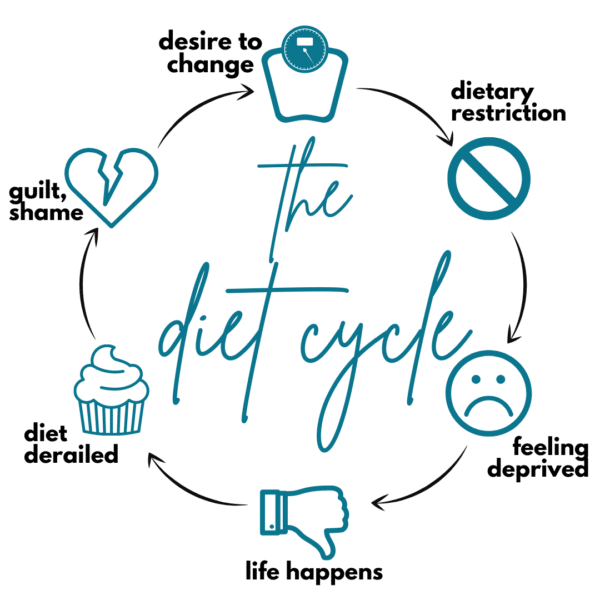
The diet cycle is a cyclical pattern of dieting attempts that many people get trapped in. The cycle goes like this:
- Desire to Change
- Dietary Restriction
- Feelings of Deprivation
- Life Happens
- Diet Derailed
- Shame + Guilt
- The Cycle Repeats
1. A Desire to Change
The diet cycle always starts with a desire to change. Maybe it’s a desire to lose weight, or to change something about your health.
To be clear: this desire to change does NOT mean you’ll end up on a diet! But it’s always a precursor to a diet. Wanting change is not a bad thing – and it is possible to create change! But dietary restriction is not going to give you the lasting change you want.
It’s important to recognize that this desire is a very common diet trigger so that you can identify when you have the chance to change and do something differently outside of the diet cycle.
2. Dietary Restriction
If you’re like most folks, when you decide you want to lose some weight or get a little healthier, you turn to a diet. Of no fault of your own – the diet industry is worth over $70 billion. They’ve put a ton of money into convincing you that a diet is what you need!
Diets typically restrict at least one of three things:
- What you can eat (often eliminating foods or entire food groups)
- How much you can eat (calorie restricted diets)
- When you can eat (i.e. intermittent fasting)
Unfortunately, the problem with dietary restriction is that it’s unsustainable – your body is designed to protect itself, not to give a thumbs up to restriction and deprivation.
3. Feeling Deprived
Ultimately, whatever new way of eating you’re trying to do is going to go out the window the second you feel deprived. Feeling deprived is a major red flag that what you’re doing is not working and will not be sustainable for lifelong change for you.
4. Life Happens
Because life happens. I like to take a realistic approach to nutrition, and that means accepting that sometimes life happens.
Sometimes it’s just the little routine disruptions, like getting off work late and not having time to make the dinner you planned. These disruptions can be good things you want, too, like celebrating a family member’s birthday, happy hour with your coworkers, or an anniversary date night with your partner.
Other times it could be bigger things, like the constant strain of a stressful job or unhealthy relationship, or something like a car accident or family emergency.
No matter the disruption, when coupled with feeling deprived, this is when your diet goes off the rails.
5. Diet Derailed
There are so many ways this could look, but inevitably it involves eating chaotically, overeating or binging. It can often be triggered by eating something off plan. Your diet convinces you certain foods are “bad,” which can lead to a “screw it” mentality when you eat that food again.
When your diet is restricted and you’re feeling deprived, there is a limit on how long you can white knuckle your way through. Human physiology can’t be escaped and you can’t out-motivate hunger.
6. Shame & Guilt
When your diet’s been derailed, it’s easy to feel guilty and ashamed – after all, diet culture tells you that it’s your fault [spoiler alert: it never is]. You feel guilty for losing control with food. You believe that not only are there good and bad foods, but you feel that you as a person are good and bad based on the food choices you make.
These are all so, so false, but they leave you immersed in shame and guilt.
This then often leaves you back at square one, wanting to change, and the diet cycle repeats.
7. The Diet Cycle Repeats
The diet cycle feeds into itself. You’ll find yourself stuck in this loop of diet after diet, never getting or feeling healthier, and just getting more and more frustrated the more cycles you complete.
Sometimes the diet cycle takes a few days, a week, or even a few months. But if you’re stuck in the diet cycle, you will see this pattern repeat.
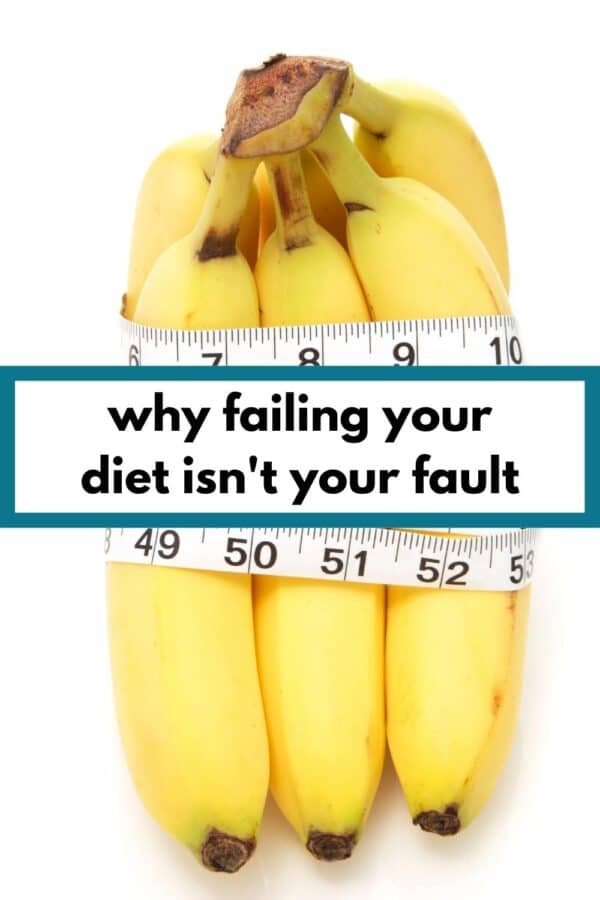
Getting Stuck in the Diet Cycle is Not Your Fault
I want to reiterate that nothing about the diet cycle is your fault. The fault lies squarely on restrictive diets. Chaotic eating (including overeating and binging) in response to restriction and deprivation is completely normal, and here’s a little exercise to show how:
Practice Activity: Your Body’s Response to Restriction
Exhale deeply, get rid of every last bit of air, then hold your breath.
Right now, just hold your breath, as long as you can.
Hold it. Keep holding. Keep holding…
Anddddd breathe!
Did you notice how that first breath was a HUGE inhale? Gasping for air, trying to inhale as much as you possibly can?
It’s like a pendulum swing – when you pull the pendulum far in one direction, it overcompensates when you release it, swinging past its neutral middle ground to the opposite extreme.
Your Body is Designed to Protect Itself
This pendulum effect with psychological and biological consequences is common in several bodily experiences:
- Holding your breath? Psychologically you’re fixated on the fact that you’re not breathing. Biologically you may start to feel a little dizzy and no matter how hard you try, you’ll soon be gasping for air.
- Sleep deprived? You’ll be overcome with fatigue and even psychologically all your thoughts will be fixated on sleeping. When you finally sleep again, you may find yourself sleeping longer than usual.
- Dehydrated? You’ll become consumed with the thought of drinking water and when you finally access water again, you’ll likely chug it, biologically requiring more to get back to a place of normal hydration.
Your Body Doesn’t Know the Difference Between Intentional Restriction (Dieting) and Unintentional Restriction (Starving, Limited Food Access)
The exact same thing happens with food restriction, too. Your body needs to be nourished, it needs food to survive. When you are severely restricting your food intake, your body doesn’t know that you’re doing it on purpose. You’re wired to survive, and if your body senses that your food intake is severely restricted, it wants to avoid starvation. You become consumed with hunger, mentally are fixated on food, and you begin to feel out of control, almost desperate.
Chaotic Eating is a Normal Biological & Psychological Response to Dietary Restriction
And when you are able to eat again? Your body’s normal, natural drive to eat kicks in and you overeat, or even binge. Eating can almost feel involuntary at times, but instead of gasping for air, you’re standing in the pantry shoveling spoonfuls of peanut butter.
There is nothing you can do. All the hacks in the world won’t be enough to subsist on severely restricted diets long-term. Your body is wired to ward off restrictions and extremes. Eventually the pendulum always swings.
And again – the diet cycle feeds into itself. Dieting and restricting is seen almost as a positive character trait, like yay! You care about your health! But binging and overeating is seen as a problem, a personal flaw. When in actuality – it’s reversed.The real problem lies with restrictive, depriving diets – and overeating and binging is just a rebound effect, a natural and normal consequence of the diets.

How to Get Out of the Diet Cycle
So what now?
Well – you need to stop dieting. The only way out of the diet cycle is to stop dietary restriction. Let go of the pendulum. Focus on nourishing your body, cultivating a better relationship with both food and your body, and finding a healthy balance.
What does this look like?
- Giving yourself permission to eat all foods that you enjoy.
- Eating enough.
- Eat in a balanced eating pattern.
- Learn to understand your hunger and fullness signals.
- Honor your hunger.
- Practice more mindful and present eating experiences.
- Create new habits by focusing on your behaviors, not outcomes.
- Focus less on what everyone says you should do, and more on what you want and need to do for you.
- Add things to your diet, habits, and life, not subtract (like instead of trying to take out carbs, could you try adding more vegetables?).
- Make sure any changes you make are realistic for you. Sure, maybe 10,000 steps is a great goal to shoot for, but would simply going for a 15 minute daily walk be a more realistic, but still slightly challenging goal for you right now?
And finally, don’t be afraid to work with a professional. So many health professionals, like myself, are here to help. I’ve got all sorts of free content (like this article on Adopting a Healthy Lifestyle!) on my site (and TikTok and Instagram!), and will be releasing a premium, affordable program later this year (sign up for the waitlist to be the first to hear about it!).
Additionally, if your relationship with food is to the point where it’s in very disordered territory or an eating disorder, I highly recommend you work with a therapist.

